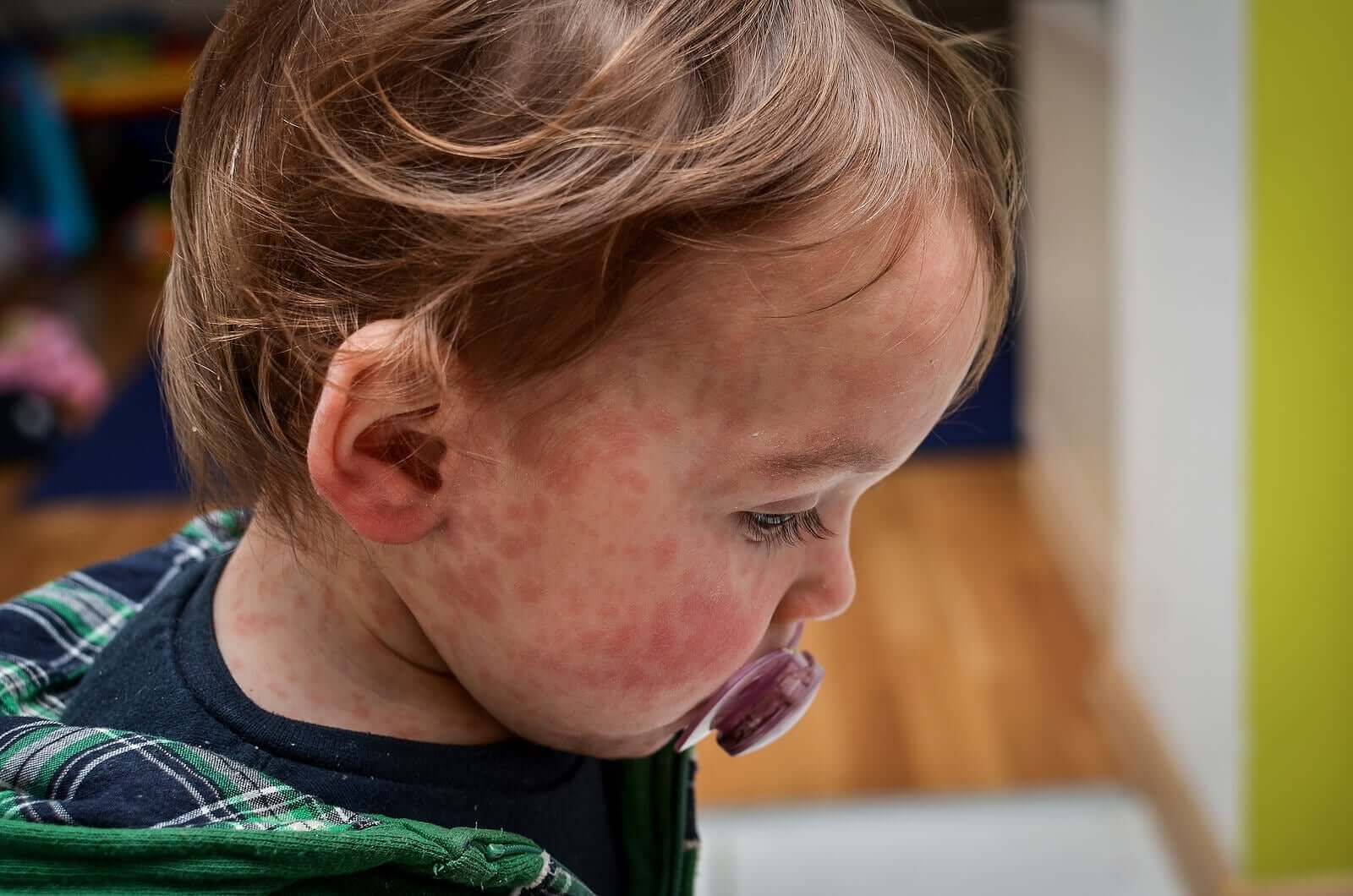The Relationship Between Food and Eczema in Babies


Written and verified by the nutritionist Silvia Zaragoza
Did you know that 20% of children often suffer from eczema? It’s the most common inflammatory skin disease in this age group. What’s more, it’s also related to the risk of developing food allergy, asthma, or rhinoconjunctivitis. For this reason, we’re going to tell you about the relationshop between food and eczema in babies.
Please note that this condition is also known as atopic dermatitis.
Environmental pollution caused by traffic and smoking increase the risk of eczema and also the likelihood of infection. The same occurs with mites and pollen.
Treatment involves the use of drugs, topical creams and oils, and the removal of the allergens that are to blame. It varies according to the severity of the symptoms, so it’s essential to consult a specialized professional. Therefore, following the diversity of approaches, the European Academy of Dermatology and Veneorology published a consensus in 2018.
Food and eczema in babies

Benefit of omega-3s.
Studies began when researchers discovered that the amount of linolenic acid in the skin is low due to a lack of specific enzymes. In turn, they lack the protein filaggrin, which forms the skin’s protective barrier. This is the reason why these children often suffer from Staphylococcus aureus infections.
According to the second part of the consensus of the Academy of Dermatology, oral evening primrose and borage oils are of no benefit. Therefore, they’re not recommended as part of the treatment. However, they’re useful topically. In addition, the intake of 5.4 grams of DHA (docosahexaenoic acid) for 8 weeks reduces the severity of eczema, as they have a high anti-inflammatory power.
You can also find Omega-3 can in oily fish – which have a recommended intake of 2 times a week – nuts and seeds. That last two should be ground to prevent little ones from choking. Also, remember to use virgin olive oil for cooking.
Vitamin D, key in the prevention of eczema in infants
Although experts are unsure whether lack of vitamin D is a cause or a consequence of dermatitis, supplementation has obtained good results. On the one hand, 90% of children age 1 year and older experience a decrease in the occurrence of skin infections.
On the other hand, having low vitamin D levels during pregnancy increases the risk of developing eczema in children. Therefore, sun exposure for at least 10 to 15 minutes a day is important for the synthesis of vitamin D.
The dosage for infants is 1000 international units (IU) of D3 daily, as long as the mother doesn’t supplement. Even as they gain weight, they can increase from 1000 total units to 1000 IU for every 11 pounds.
Are probiotics effective in reducing eczema in infants?
Most research with probiotics shows promising results, especially for the mixture of Lactobacillus species versus Bifidobacteria alone. However, experts have yet to establish dosages, duration, and specific recommended strains. In addition, the administration of some, such as L.rhamnosus GG, is ineffective in preventing eczema during the first 6 months of life.
Allergies and eczema
Finally, we know there’s a positive relationship in the presence of eczema and allergies in infants and children. This doesn’t imply the need to eliminate the consumption of foods such as dairy and eggs. Or even nuts or peanuts. The main reasons are the following:
- Difficulty in maintaining the diet in the long term
- Scarce evidence on the benefits of eliminating them
- Lack of effectiveness in children

In addition, a positive allergy test is necessary before cutting out the intake of such foods. With this relationship in mind, the question was raised as to whether bringing forward or delaying the introduction of foods had any effect on the increased predisposition.
After investigation, there was no effect, although there’s a window period between 4 and 6 months.
In summary, at the slightest suspicion, consult a dermatologist for advice on how to deal with food and eczema in infants.
If you know which foods aggravate your baby’s symptoms, consult a dietician-nutritionist who can explain which diet to follow. Good hydration by drinking water and using creams for sensitive skin is also important. In this way, you can improve skin health.
https://eresmama.com/alimentacion-eczemas-bebes/
Did you know that 20% of children often suffer from eczema? It’s the most common inflammatory skin disease in this age group. What’s more, it’s also related to the risk of developing food allergy, asthma, or rhinoconjunctivitis. For this reason, we’re going to tell you about the relationshop between food and eczema in babies.
Please note that this condition is also known as atopic dermatitis.
Environmental pollution caused by traffic and smoking increase the risk of eczema and also the likelihood of infection. The same occurs with mites and pollen.
Treatment involves the use of drugs, topical creams and oils, and the removal of the allergens that are to blame. It varies according to the severity of the symptoms, so it’s essential to consult a specialized professional. Therefore, following the diversity of approaches, the European Academy of Dermatology and Veneorology published a consensus in 2018.
Food and eczema in babies

Benefit of omega-3s.
Studies began when researchers discovered that the amount of linolenic acid in the skin is low due to a lack of specific enzymes. In turn, they lack the protein filaggrin, which forms the skin’s protective barrier. This is the reason why these children often suffer from Staphylococcus aureus infections.
According to the second part of the consensus of the Academy of Dermatology, oral evening primrose and borage oils are of no benefit. Therefore, they’re not recommended as part of the treatment. However, they’re useful topically. In addition, the intake of 5.4 grams of DHA (docosahexaenoic acid) for 8 weeks reduces the severity of eczema, as they have a high anti-inflammatory power.
You can also find Omega-3 can in oily fish – which have a recommended intake of 2 times a week – nuts and seeds. That last two should be ground to prevent little ones from choking. Also, remember to use virgin olive oil for cooking.
Vitamin D, key in the prevention of eczema in infants
Although experts are unsure whether lack of vitamin D is a cause or a consequence of dermatitis, supplementation has obtained good results. On the one hand, 90% of children age 1 year and older experience a decrease in the occurrence of skin infections.
On the other hand, having low vitamin D levels during pregnancy increases the risk of developing eczema in children. Therefore, sun exposure for at least 10 to 15 minutes a day is important for the synthesis of vitamin D.
The dosage for infants is 1000 international units (IU) of D3 daily, as long as the mother doesn’t supplement. Even as they gain weight, they can increase from 1000 total units to 1000 IU for every 11 pounds.
Are probiotics effective in reducing eczema in infants?
Most research with probiotics shows promising results, especially for the mixture of Lactobacillus species versus Bifidobacteria alone. However, experts have yet to establish dosages, duration, and specific recommended strains. In addition, the administration of some, such as L.rhamnosus GG, is ineffective in preventing eczema during the first 6 months of life.
Allergies and eczema
Finally, we know there’s a positive relationship in the presence of eczema and allergies in infants and children. This doesn’t imply the need to eliminate the consumption of foods such as dairy and eggs. Or even nuts or peanuts. The main reasons are the following:
- Difficulty in maintaining the diet in the long term
- Scarce evidence on the benefits of eliminating them
- Lack of effectiveness in children

In addition, a positive allergy test is necessary before cutting out the intake of such foods. With this relationship in mind, the question was raised as to whether bringing forward or delaying the introduction of foods had any effect on the increased predisposition.
After investigation, there was no effect, although there’s a window period between 4 and 6 months.
In summary, at the slightest suspicion, consult a dermatologist for advice on how to deal with food and eczema in infants.
If you know which foods aggravate your baby’s symptoms, consult a dietician-nutritionist who can explain which diet to follow. Good hydration by drinking water and using creams for sensitive skin is also important. In this way, you can improve skin health.
https://eresmama.com/alimentacion-eczemas-bebes/
All cited sources were thoroughly reviewed by our team to ensure their quality, reliability, currency, and validity. The bibliography of this article was considered reliable and of academic or scientific accuracy.
- Wollenberg, A; Barbarot, S; Bieber, T; Christen-Zaech, S; Deleuran, M; Fink-Wagner, A et al (2018) Consensus-based European guidelines for treatment of atopic eczema (atopic dermatitis) in adults and children: part I. JEur Acad Dermatol Venereol, 32(5): 657-82.
- Wollenberg, A; Barbarot, S; Bieber, T; Christen-Zaech, S; Deleuran, M; Fink-Wagner, A et al (2018) Consensus-based European guidelines for treatment of atopic eczema (atopic dermatitis) in adults and children: part II. JEur Acad Dermatol Venereol, 32(6): 850-78.
- Dennin, M; Lio, P A (2017) Filaggrin and childhood eczema. Arch Dis Child, 102(12): 1101-02.
- Schlichte, M J;Vandersall, A; Rajani Katta, R (2016) Diet and eczema: a review of dietary supplements for the treatment of atopic dermatitis. Dermatol Pract Concept, 6(3): 23-9.
- Obbagy, J E; English, L K; Ping Wong, Y; Butte, N F; Dewey, K G; Fleischer, D M et al(2019) Complementary feeding and food allergy, atopic dermatitis/eczema, asthma, and allergic rhinitis: a systematic review. Am J Clin Nutr, 109 (S7): 890-934.
- Cabana, M D; McKean, M; Caughey, A B; Fong, L; Lynch, S; Wong, A et al. (2017) Early Probiotic Supplementation for Eczema and Asthma Prevention: A Randomized Controlled Trial. Pediatrics, 140(3)
- Waidyatillake, N T; Dharmage, S C; Allen, K J; Bowatte, G; Boyle, R J; Burgess, J A et al (2018) Association between the age of solid food introduction and eczema: A systematic review and a meta-analysis. Clin Exp Allrgy, 48(8): 1000-15.
- Wei, Z; Zhang, J; Yu, X (2016) Maternal vitamin D status and childhood asthma, wheeze, and eczema: A systematic review and meta-analysis. Pediatr Allergy Immunol, 27(6): 612-9.
- Mustapa Kamal Basha, M A; Abdul Majid, H; Razali, N; Yahya, A (2020) Risk of eczema, wheezing and respiratory tract infections in the first year of life: A systematic review of vitamin D concentrations during pregnancy and at birth. Plos One, 15(6).
- Yang, W; Tu, R; Hu, Y; He, T; Zhang, W; Gu, L et al (2019) Probiotics supplement for the prevention of eczema in children: Study protocol for a meta-analysis and systematic review. Medicine, 98(34).
This text is provided for informational purposes only and does not replace consultation with a professional. If in doubt, consult your specialist.








